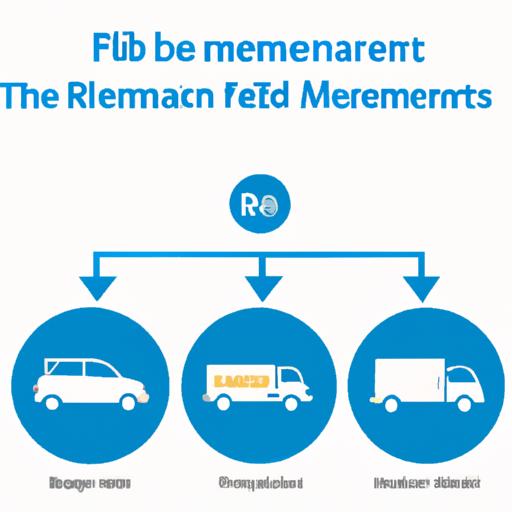In a world where businesses are constantly seeking innovative solutions to remain competitive and reduce operating costs, usage-based insurance (UBI) has emerged as a game-changer for commercial fleets. By leveraging telematics technology, UBI offers fleet managers a customizable and data-driven approach to managing risk and optimizing their insurance coverage. This article explores the benefits of UBI for commercial fleets, highlighting how this cutting-edge insurance model can revolutionize the way companies protect their assets and improve their bottom line.
Table of Contents
- 1. Revolutionizing Fleet Management: Usage-Based Insurance
- 2. How Usage-Based Insurance is Transforming Commercial Fleets
- 3. The Future of Fleet Management: Usage-Based Insurance
- 4. Unlocking Savings and Efficiency with Usage-Based Insurance
- 5. The Benefits of Usage-Based Insurance for Commercial Fleets
- 6. Implementing Usage-Based Insurance: A How-To Guide for Fleet Managers
1. Revolutionizing Fleet Management: Usage-Based Insurance
Imagine a world where insurance premiums are no longer based on generic calculations, but on your actual driving habits and behaviors. With usage-based insurance (UBI), fleet management is set to undergo a transformative shift. By utilizing telematics devices installed in vehicles, UBI collects data on factors like speed, mileage, and braking patterns to determine insurance rates. This data-driven approach not only promotes safer driving practices but also provides a fairer pricing model for fleet operators.
With UBI, fleet managers can gain valuable insights into their drivers’ performance, enabling them to identify areas for improvement and implement targeted training programs. This proactive approach to risk management can lead to fewer accidents, reduced maintenance costs, and ultimately, lower insurance premiums. By harnessing the power of technology and data analytics, UBI is revolutionizing fleet management, paving the way for a more efficient and cost-effective insurance model.

2. How Usage-Based Insurance is Transforming Commercial Fleets
Usage-Based Insurance (UBI) is revolutionizing the way commercial fleets operate and manage their insurance policies. With UBI, fleet managers can track and monitor their vehicles in real-time, allowing for more precise and accurate assessments of risk factors. This data-driven approach enables fleets to optimize their operations, reduce costs, and improve overall safety.
UBI also provides fleets with personalized insurance premiums based on their specific driving habits and patterns. By analyzing factors such as speed, acceleration, braking, and cornering, insurance providers can offer customized pricing that rewards safe and responsible driving. This not only incentivizes drivers to adopt safer behaviors but also helps fleets save money on insurance premiums in the long run. UBI is transforming the commercial fleet industry by promoting accountability, efficiency, and safety on the road.
3. The Future of Fleet Management: Usage-Based Insurance
Usage-based insurance (UBI) is an innovative approach to fleet management that utilizes telematics technology to monitor driver behavior, vehicle performance, and overall usage in real-time. By collecting data on how vehicles are driven, UBI allows fleet managers to tailor their insurance policies based on actual usage rather than generic assumptions. This not only helps in reducing insurance costs but also promotes safer driving practices among employees.
With the advancements in telematics technology, the future of fleet management looks promising with UBI at the forefront. Some of the potential benefits of UBI for fleet management include:
- Personalized insurance premiums based on actual vehicle usage
- Improved fleet safety through real-time monitoring and feedback
- Reduced operational costs by identifying inefficient driving habits
4. Unlocking Savings and Efficiency with Usage-Based Insurance
Usage-based insurance (UBI) is revolutionizing the way insurance companies assess risk and calculate premiums. By utilizing telematics technology, UBI programs track driver behavior in real-time, allowing for personalized insurance rates based on actual driving habits. This innovative approach not only incentivizes safer driving practices but also provides customers with the opportunity to save money on their premiums. Through UBI, drivers have the ability to take control of their insurance costs by demonstrating responsible driving behavior.
With UBI, customers can enjoy a range of benefits, including:
- Lower insurance premiums for safe driving habits
- Real-time feedback on driving behavior
- Potential discounts for low mileage
- Customized insurance rates based on individual driving patterns
UBI offers a dynamic and cost-effective alternative to traditional insurance models, unlocking savings and efficiency for both insurers and policyholders alike.
5. The Benefits of Usage-Based Insurance for Commercial Fleets
Usage-based insurance (UBI) for commercial fleets offers numerous advantages that can greatly benefit businesses. Here are some of the key benefits:
- Cost savings: UBI allows businesses to pay for insurance based on actual usage and driving behavior, resulting in potential cost savings. Companies can save money by rewarding safe driving habits and reducing premiums for low-risk drivers.
- Improved safety: UBI encourages safer driving practices among fleet drivers as they are aware that their driving behavior is being monitored. This can lead to a reduction in accidents, resulting in fewer claims and lower insurance costs for the business.
6. Implementing Usage-Based Insurance: A How-To Guide for Fleet Managers
Implementing usage-based insurance (UBI) for fleet managers can be a game-changer in optimizing costs and improving overall operational efficiency. Here are some key steps to guide you through the process:
- Research UBI Providers: Look for insurance providers that offer UBI programs tailored for fleet management. Compare services, pricing, and track records to find the best fit for your needs.
- Assess Fleet Data: Evaluate your fleet’s data collection capabilities and determine how UBI can leverage this data to improve driver behavior and reduce risk.
- Train Drivers: Educate your drivers on how UBI works, why it’s being implemented, and how their behavior behind the wheel can impact insurance costs.
By following these steps and working closely with your chosen UBI provider, you can successfully implement a usage-based insurance program that benefits both your fleet and your bottom line.
usage-based insurance offers a promising solution for commercial fleets looking to optimize their operations and reduce costs. By leveraging technology and data analytics, companies can better understand their drivers’ behavior and make more informed decisions to improve safety and efficiency on the road. As the industry continues to evolve, adopting usage-based insurance may become a standard practice for fleet managers looking to stay ahead of the curve. Stay tuned for more updates and advancements in this exciting field!
